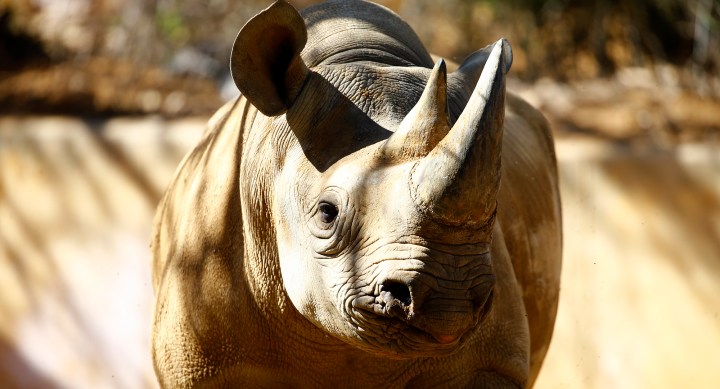WILDLIFE CONSERVATION
Rhino poaching declines in Africa, but white rhino in Kruger Park hardest hit

Rhino poaching across Africa saw a significant decrease during strict Covid-19 lockdowns. But as the restrictions loosened, poachers intensified their onslaught on the threatened species, with South Africa hardest hit.
Rhino poaching rates across the African continent have decreased by more than half compared with peak rates in 2015, with 90% of the reported poaching cases being in South Africa.
That’s according to the International Union for Conservation of Nature’s (IUCN’s) Species Survival Commission African Rhino Specialist Group following the release of a report by the group and the wildlife trade specialist NGO Traffic.
The report found that rhino poaching rates had continued to decline from a peak of 5.3% of their total population in 2015 to 2.3% in 2021. In numbers, at least 2,707 rhinos were poached across Africa between 2018 and 2021. These numbers included the near-threatened (on the IUCN Red List of Threatened Species) white rhino and the rarer critically endangered black rhino.
Kruger Park
In South Africa, the poaching mainly affected the white rhinos of the Kruger National Park, where the bulk of the world’s white rhino population is found. The white rhino population has since declined by almost 12% across the continent, from 18,067 to 15,942, the IUCN specialist group reported.
Black rhinos, on the other hand, have increased by about 12%, from 5,495 to 6,195. Four range states are responsible for conserving the rare African black rhino, with Namibia responsible for 34.8% (2,156 out of 6,195), South Africa 33.2% (2,056), Kenya 15.1% (938) and Zimbabwe 9.9% (616), the report said.
“The overall decline in poaching of rhinos is encouraging, yet this remains an acute threat to the survival of these iconic animals,” said Dr Sam Ferreira, a scientific officer with the IUCN SSC African Rhino Specialist Group.
“To support the growth of rhino numbers, it is essential to continue active population management and anti-poaching activities for all subspecies across different range states.”
Ninety percent of poaching cases are in SA
According to the report, the continent has about 22,137 rhinos, while there were 23,432 rhinos globally by the end of 2021. Meanwhile, 2,707 poaching incidents of the black and white rhino were recorded in Africa between 2018 and 2021, the report said. Ninety percent of the cases were in South Africa, particularly the Kruger National Park, which holds the largest population of white rhinos globally.
“It’s not surprising that South Africa was most affected by this illegal trade [of rhino horn], as the country contains more than half of the rhinoceroses that occur in Africa,” the report stated.
The African rhino population had seen a 1.6% decline per annum from 2018 to 2021 and a 3.9% decline in poaching rates. To increase African rhino numbers, the poaching rate needs to be kept below 3.6%, the report recommended.
Visit Daily Maverick’s home page for more news, analysis and investigations
Earlier this month, the Department of Forestry, Fisheries and the Environment (DFFE) said poaching numbers had climbed after a steady decline over the years, with the increase due to an uptick of poaching in private reserves.
259 rhino killed this year as poachers shift focus from Kruger to KZN and private game reserves
A previous decline in poaching had been attributed to the Covid-19 lockdowns which, due to limited mobility, saw a sharp decrease in rhino poaching numbers globally and locally, compared with previous years. South Africa experienced 394 rhino poaching incidents in 2020, with the Kruger National Park seeing a reduction of almost 80% in cases during this time. This number climbed to 451 the following year, the report found.
“Better reporting of seizure data will help us better quantify the extent of horns entering illegal trade for future reports. Although we cannot say with exact certainty what impact Covid-19 restrictions have had on rhino horn trade, 2020 did represent an abnormal year with low levels of reported illegal activity, law enforcement and government reporting. The continued and consistent monitoring of illegal trade is vital,” said Sabri Zain, Traffic’s director of policy.
Increased anti-poaching efforts
Declining poaching numbers in the Kruger National Park, which had 82 poaching incidents this year alone, according to a DFFE report, have been credited to increased anti-poaching efforts that have seen tightened measures and stronger partnerships between the private and public sectors.
However, the increasing demand for rhino horn as a wealth and status symbol, mainly in Asia, continues to threaten these efforts. Between 575 and 923 African rhino horns entered the illegal trade market each year from 2018 to 2020, the report found. In 2016 and 2017, this number stood at 2,378 African rhino horns per year.
“Transnational organised crime networks and the corruption they create continue to threaten rhinos. These networks are a risk to the safety and security of wildlife, and the people living around them and those working to conserve them.
“We know these challenges are global in nature and transnational collaboration and cooperation are required to overcome them, such as has been proven through multi-agency wildlife crime units.
“We must continue targeted efforts to build resilience to corruption, and to address the problem at the source in the form of illegal demand for rhino horn,” said Dr Margaret Kinnaird, the wildlife practice leader at WWF. DM/OBP
















 Become an Insider
Become an Insider
Comments - Please login in order to comment.